Blog
Read Dr. Kenneth M. Mash’s remarks to the Board of Governors – Aug. 22, 2017
Chairwoman Shapira, Governors,
I am here because we learned that today you would be considering an exception to Board of Governors Policy 1985-01-A — specifically an exception for Cheyney University to the language in that policy that requires universities to provide an opportunity for students who are enrolled or admitted to complete a program that is put in moratorium.
While I understand the very serious looming deadlines that are quickly approaching for Cheyney University, I think it would have been in everyone’s best interest if the subject of the meeting was more broadly publicized so that those who will be affected by any change would have notice and an opportunity to speak up. While I know this is not required by the Sunshine Act, the Office of Open Records does state that it is “good practice” to include the subject of the meeting in a special-meeting notice.
That aside, I am speaking on the best knowledge I have right now, which is thirdhand information. I will not speak today about the impact on faculty. We have a contractually mandated forum to make those cogent arguments, and we certainly will.
Should you still be considering this action today, I would ask that you pause. While the deadline is nearing quickly, it is premature to make this exception. Generally, I think it unwise to make exceptions for Cheyney University. Cheyney’s problems have not come about because it has been treated differently; they exist because the expectations of that university have, historically, been different. I have made that case many times, and I won’t go into detail now. I do have concern about the optics of making this exception for this one university. I also have general concerns about this Board heading down the path of making exceptions for any particular university.
Nevertheless, taking action today would be premature. Unless there is information that has not been shared that should have been shared with us, nobody yet knows what programs may be put into moratorium. Nobody knows how many students may be affected. Should those students not be able to know that the rules may be changed for them? Should they not be given an opportunity to share their concerns before a decision is made?
If the rules are to be different for the State System’s only HBCU, has everyone fully considered the consequences? What student would want to attend a university that has a history of closing programs on the students who attend? Not that long ago, we all used to say that a university’s catalogue was its contract with students. What type of word-of-mouth will be generated among generations of families, friends, and acquaintances, should that contract be broken? While the short term presents us with the most difficult of circumstances, what good is it to damage the future for the present?
The latest that I have heard includes the prospect that any of these students will be granted admission at another State System university and that they will be able to take scholarship monies with them. Is that really sufficient? Will they be guaranteed dorm space when they transfer? Will the cost of the dorms and other fees be comparable? Will they be given additional support so that they can effectively transition? I hope all of this is part of the consideration, and that attention is paid to each individual student.
There are populations of students who need Cheyney University to succeed so that they may have a chance at the American Dream. They don’t need Cheyney to survive in skeleton form as a monument to our de jure segregationist past. They do need it, among many other reasons, because racism persists.
I applaud the Board for its determination to change what needs to be changed at Cheyney University. I applaud those at the University who are doing their best under dire circumstances. I only hope that we pay every bit of attention to current and future Cheyney students that we possibly can. Thus, we urge the Board to hear them out, to look out for their futures, and to continue efforts to transform Cheyney back to a thriving university.
Role of a life: Theater professor donates part of liver to Clarion graduate
Marilouise Michel was scrolling through her Facebook feed early this year when a Clarion University graduate’s post leapt out at her.
Stevette Wano Rosen’s friend, a fellow Clarion graduate, needed a new liver. The donor must have a matching blood type and be able to take four to six weeks off work. Michel, a theater professor at Clarion, met both criteria.
“This has always been something that’s been an interest of mine,” she said of organ donation. Her father was a surgeon, and her cousin had a kidney transplant, among other inspirations.
Michel wrote to Rosen for details and learned about Tammy Pawlak, who had been in a coma and has an 8-year-old daughter.
“I was sitting in my office in the university, and I took a deep breath, and I typed, ‘I’m O positive,’” Michel said. “Everything from there was in capital letters.”
The exchange triggered a whirlwind of meetings, testing (including 43 vials of blood drawn), and paperwork. For privacy reasons, doctors did not introduce Michel and Pawlak, but the two chose to meet in Maryland.
“We tried to be really mutually supportive through the whole thing,” Michel said. “Because (Tammy) was a student, she almost feels like a distant relative. I’ve been at Clarion 27 years, so it feels like she’s a part of my family.”
Rosen echoed the feeling of kinship.
“I was absolutely blown away — relieved but not surprised because of Mel’s personality and all of our passion for Clarion University,” Rosen said. “You just become a family.”
‘A fabulous cake’
The donation process culminated June 6, when Michel underwent a multi-hour surgery at the University of Maryland Medical Center. When it was over, she’d given 60 percent of her liver to someone she’d known a few months. Her souvenir: a 36-staple “shark bite,” as she calls it, winding across her abdomen.
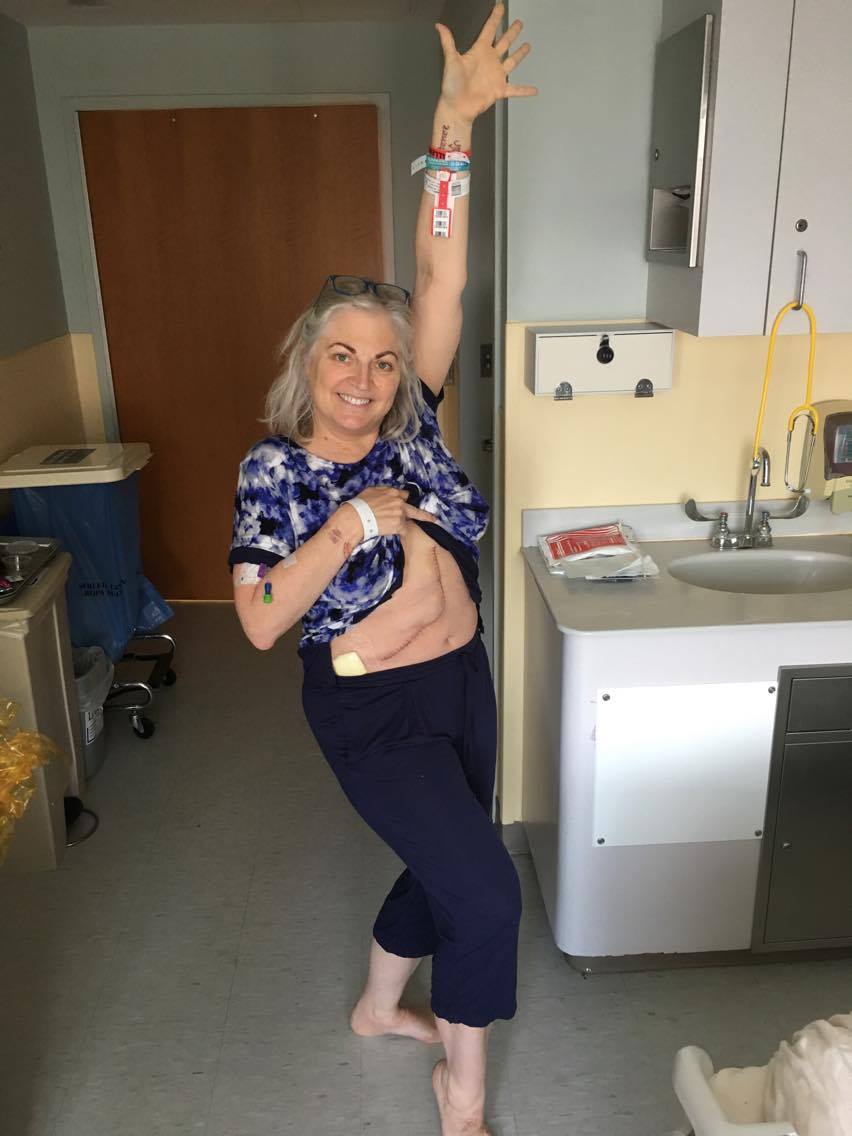
Marilouise Michel, a theater professor at Clarion University, shows off her “shark bite,” after donating part of her liver to a Clarion graduate. Photo courtesy of Marilouise Michel
“I really feel like it’s not something I do,” she said. “It’s something doctors do, but they can’t do it without the ingredients — almost like a chef making a fabulous cake. I’m able to supply the ingredient to do this wonderful thing for this person.”
The recipe required some preparation: Michel followed a strict diet when she was concerned about one of her test results, and she cut alcohol in April.
“I did spend a lot of time dreaming about pizza and beer,” she said with a laugh. Her doctors cleared her to drink moderately eight weeks after surgery, and she had her first post-donation beer in early August.
Michel, a yoga teacher, also craved movement.
“I was doing yoga poses on the gurney (in the preparation room),” she said, because she knew some positions would be off-limits for a few weeks after the procedure.
She’s had no complications so far and planned a summer of sailing and “gentle camping in the woods away from doctors and needles,” she said. At an appointment in early August, Michel saw MRI images that showed her liver regeneration was “pretty much done now,” she said.
Collaboration was another critical ingredient, Michel said. She cited her family, her aerobics class that donated restaurant gift cards to her family, in-laws in Maryland who provided accommodations when she was in Baltimore for appointments, supportive colleagues, and friends.
“It was a real team effort,” she said. “I just happened to be the person who got cut open.”
Knowledge is power
A comfort to Michel throughout the process was the knowledge that she was not obligated to donate, she said. It was her choice.
“I was constantly checking in with myself and my liver, asking ‘are you OK with this?’” she said.
Pawlak was relieved the transplant went as smoothly as it did, she said from her home in Maryland. Her recovery has been slower than Michel’s, but she’s thinking positively, she said.
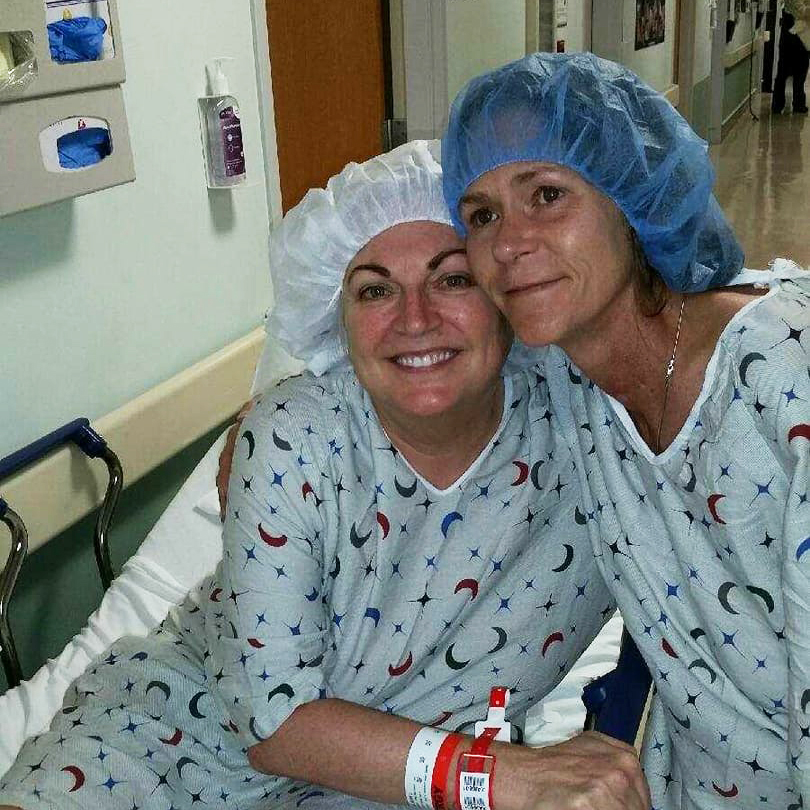
Marilouise Michel, left, and Clarion University graduate Tammy Pawlak take a photograph before their surgeries in June. Photo courtesy of Marilouise Michel
“I’m taking it one day at a time, baby steps,” she said. “Every day is a step toward 100 percent.”
The healthier she becomes, the closer Pawlak is to a trip to Clarion, where she has family — and friends.
“Clarion brought us all together,” Pawlak said. “I’ll forever be grateful for Stevette and Mel.”
Meanwhile, Michel intends to continue advocating for organ donation.
“So many people are waiting for livers, and you have to be so sick to be at the top of the list to get deceased donors,” Michel explained. “There’s a much better success rate with living donors.”
Michel has plans to make that success possible for others.
“My biggest contribution will be with my mouth … demystifying the process,” she said. “I think it’s the unknown that’s scary. If you can talk to somebody that’s been through it, maybe that can help people. I’m an educator. Knowledge is power. The more I can help people understand the process, the more other people can help people, too.”
Helping can be as simple as opting to be an organ donor on one’s license or giving blood, something Michel does regularly, she said.
“I could go to sleep and let somebody cut a hole in me and cut out part of my liver,” she said. “I don’t think it makes me a great hero because I think everybody has what they can do. I wish I could save lives every day. I help kids hopefully pursue their dreams. This is a way that I could help Tammy pursue her dream of being a mom.”
—Kathryn Morton, APSCUF communications director
APSCUF welcomes second faculty intern from Slippery Rock University
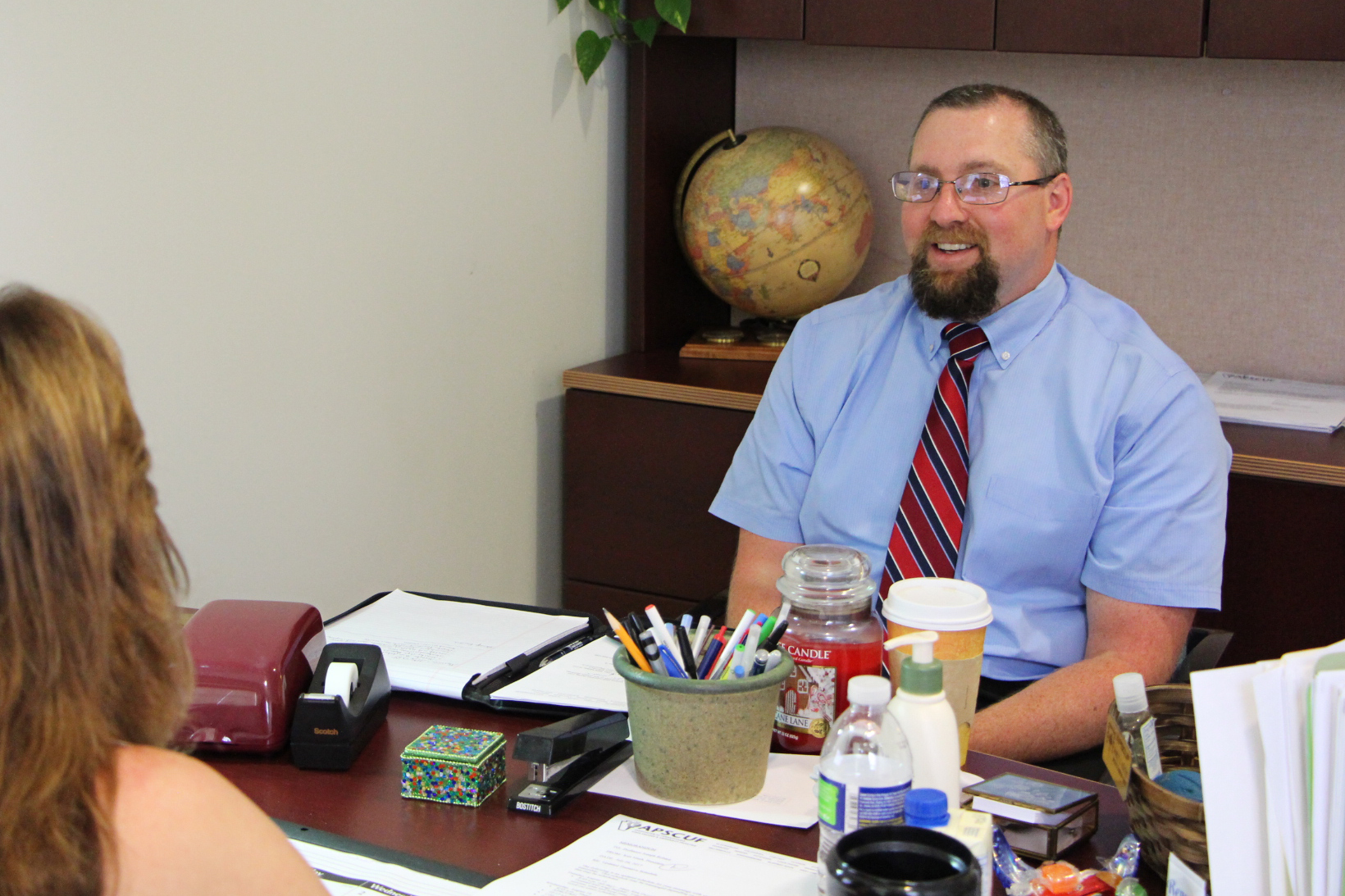
We are delighted to have Joseph Robare, Slippery Rock University faculty member, as our faculty intern this week. He will be in the Harrisburg office interacting with staff members and observing the spectrum of union administration. Click here to learn more about APSCUF’s faculty and coaches orientation internships.
Summer internship full of learning, experience
When I first accepted my internship offer at APSCUF, I was overwhelmed with excitement, but I was a little anxious to move across the state entirely by myself for the summer.
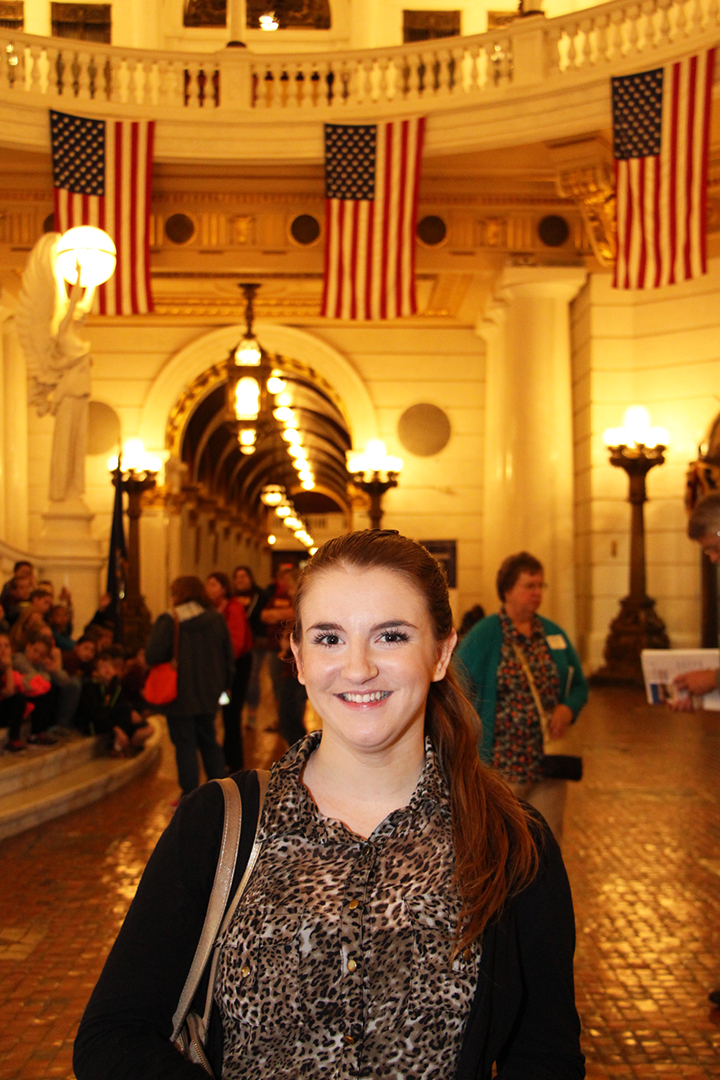
Lindsey Newton, APSCUF intern, visits the Pennsylvania Capitol in June.
The APSCUF staff made my transition as easy as possible. Everyone was friendly and made me feel like a part of the staff from the very beginning.
This internship is special because you experience two internships in one. You work closely with the director of communications and the director of government relations, making it a great experience for any related major.
As a political-science student, going to the State Capitol and meeting with legislators and lobbyists was one of my favorite opportunities. It was exciting to get an inside perspective of what was happening, particularly during the budget season.
APSCUF has weekly staff meetings, which is a great way to catch up on what is happening within the union during the upcoming week. I also went to a few Board of Governors meetings. It was interesting to see the board vote on different issues, such as the tuition increase, firsthand.
I attended a few different rallies this summer. During the rallies, I ran APSCUF’s Instagram and Snapchat. I learned a lot about managing social-media accounts for APSCUF. I already began using these skills to enhance the social-media presence of Slippery Rock’s Young Progressives, of which I am co-founder and president.
I interviewed members of APSCUF, both professors and coaches. It was exciting to meet so many different people. This was my first time writing an interview, so I was interested in learning a more creative style of writing.
My internship was not limited to learning at APSCUF. I shadowed a lobbyist from Triad Strategies for a day. I sat in on a meeting about healthcare and learned about some of Triad’s clients and what their firm lobbies for, such as education and healthcare.
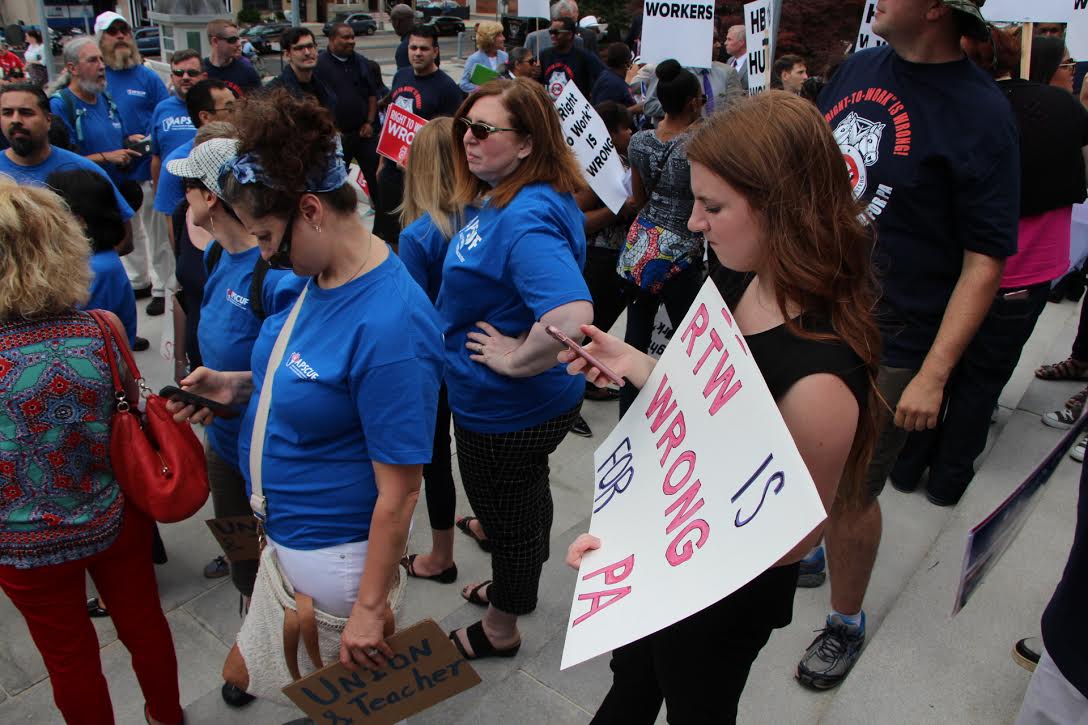
Newton, holding a poster she made for the PA Conference of Teamsters’ anti-“right-to-work” rally in June, posts photos to APSCUF’s Instagram account.
This year is APSCUF’s 80th anniversary. Interning during this time has been a memorable experience. To prepare for APSCUF’s celebration in September, I had the opportunity to look at various documents dating back to the ’40s. I even learned how to use a microfilm to read meeting minutes from the ’70s. I looked through and organized countless pictures of past events and members. Being able to see various parts of APSCUF’s history made me more grateful for this internship. I felt like I understood APSCUF and its members better.
Beyond the amazing experiences from interning, another benefit is APSCUF provides housing for interns who do not live nearby, making the internship accessible for all students in the State System, not just for students near the Harrisburg area.
My experience at APSCUF has been invaluable to me. I learned so much, lessons I likely would not have learned if it were not for this internship. I am grateful for the knowledge I gained, the experiences I had, and the connections I made during my time at APSCUF.
If you want firsthand experience on how our faculty union functions, while gaining experience in a field you enjoy, then apply for APSCUF’s internship. APSCUF is a great union for our universities’ amazing professors and coaches, and I am thankful to have been a part of it for the summer.
Lindsey Newton, APSCUF’s government-relations and communications intern for summer 2017, will be a senior this year at Slippery Rock University.
APSCUF life: Outside work translates back into classroom
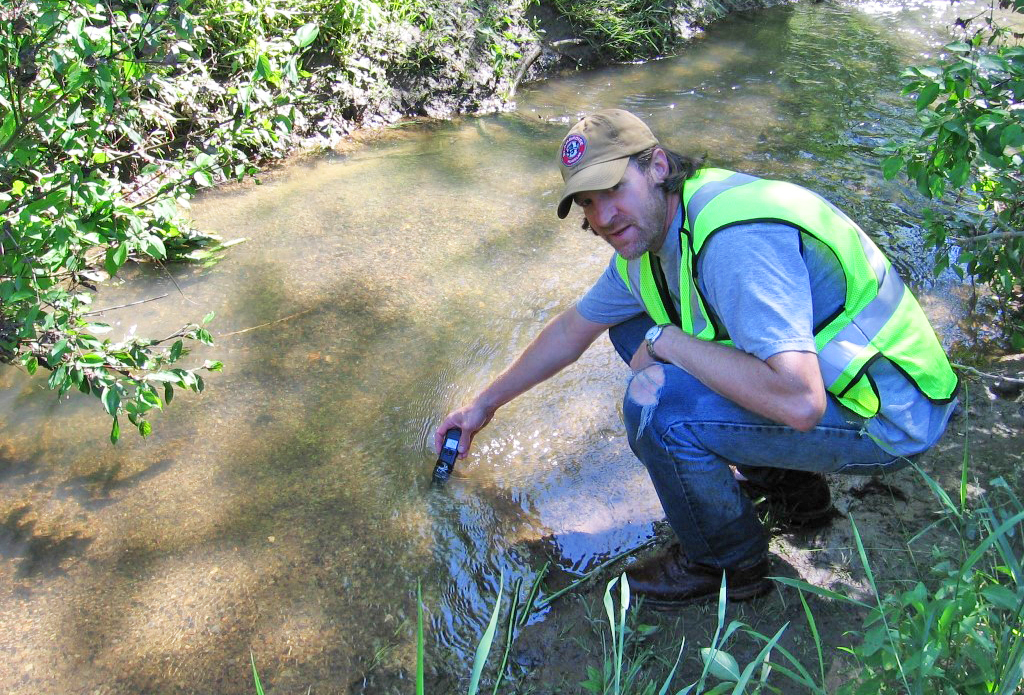
Dr. Brian Okey, associate professor in Indiana University of Pennsylvania, tests water near Beaver Run Reservoir. Photo courtesy of Brian Okey.
Last summer, APSCUF went behind the scenes to show how faculty members and coaches continue to devote themselves to affordable, quality education even when class is not in session. This post is a continuation of that series.
As an associate professor in Indiana University of Pennsylvania’s department of geography and regional planning, Dr. Brian Okey spends much of his time outside the classroom.
“My emphasis has always been on environmental issues, more specifically, resource issues,” Okey said.
When concerns began to rise about the negative effects Marcellus Shale gas-well drilling might have on the water supply of Beaver Run Reservoir, Okey got involved.
Okey and colleague Nate McElroy began collaborating with the Municipal Authority of Westmoreland County on the Beaver Run Project in 2011. The project monitors the quality of water around Beaver Run Reservoir, a source of water for around 130,000 people.
The project employs roughly half a dozen students — undergraduate and graduate — each year.
“The project feeds into classroom teaching, while providing employment and practical experience for students,” Okey said.
The team of faculty and students goes out to the sites quarterly to sample the water. This is done usually throughout three days, typically on weekends to accommodate everyone’s schedule. A normal day of sampling takes between four to six hours, Okey said.
“There is a lot of rigorous hiking throughout the trails to get to the site,” he said. “It’s very physically demanding.”
Aside from the hours onsite, the project requires upkeep on the field data and equipment. Okey and his students work with geographic systems to maintain maps and other information.
Students also have an opportunity to gain experience abroad. Okey and colleague Sudeshna Ghosh developed courses with the department of architecture and regional planning at Indian Institute of Technology, Kharagpur, to bring students to India to collect field data. This past June, the team gathered information about the water quality in the wetlands east of Kolkata. This region is a vital source of fish and vegetables for the citizens, Okey said.
Okey is also part of a nonprofit group called the Altman Watershed Association for Restoring the Environment, of which he is the former president. The group works to protect streams from coal mining, is constructing a rail trail, and it participates in an annual trash cleanup.
This outside work can be translated back to the classroom learning experience for the students, Okey said.
—Lindsey Newton, APSCUF intern